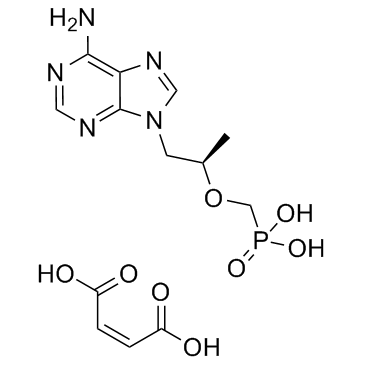Tenofovir maleate
Modify Date: 2025-08-25 18:05:03

Tenofovir maleate structure
|
Common Name | Tenofovir maleate | ||
|---|---|---|---|---|
| CAS Number | 1236287-04-9 | Molecular Weight | 403.284 | |
| Density | N/A | Boiling Point | N/A | |
| Molecular Formula | C13H18N5O8P | Melting Point | N/A | |
| MSDS | N/A | Flash Point | N/A | |
Use of Tenofovir maleateTenofovir Disoproxil Fumarate is a nucleotide reverse transcriptase inhibitor to treat HIV and chronic Hepatitis B. |
| Name | Tenofovir maleate |
|---|---|
| Synonym | More Synonyms |
| Description | Tenofovir Disoproxil Fumarate is a nucleotide reverse transcriptase inhibitor to treat HIV and chronic Hepatitis B. |
|---|---|
| Related Catalog | |
| In Vitro | Tenofovir shows cytotoxic effects on cell viability in HK-2 cells, with IC50 values of 9.21 and 2.77 μM at 48 and 72 h in MTT assay, respectively. Tenofovir diminishes ATP levels in HK-2 cells. Tenofovir (3.0 to 28.8 μM) increases oxidative stress and protein carbonylation in HK-2 cells. Furthermore, Tenofovir induces apoptosis in HK-2 cells, and that apoptosis is induced via mitochondrial damage[1]. Tenofovir and M48U1 formulated in 0.25% HEC each inhibits the replication of both R5-tropic HIV-1BaL and X4-tropic HIV-1IIIb in activated PBMCs, and inhibits several laboratory strains and patient-derived HIV-1 isolates. The combined formulation of M48U1 and tenofovir in 0.25% HEC exhibits synergistic antiretroviral activity against infection with R5-tropic HIV-1BaL, and is not toxic to PBMCs[2]. |
| In Vivo | Tenofovir Disoproxil Fumarate (20, 50, 140, or 300 mg/kg) administered to BLT mice, shows dose dependent activity during vaginal HIV challenge in BLT humanized mice. Tenofovir Disoproxil Fumarate (50, 140, 300 mg/kg) significantly reduces HIV transmission in BLT mice[3]. Tenofovir Disoproxil Fumarate (0.5, 1.5, or 5.0 mg/kg/day, p.o.) induces a dose-dependent decline in serum viremia in woodchucks chronically infected with WHV. Tenofovir Disoproxil Fumarate administration is safe and effective in the woodchuck model of chronic HBV infection[4]. |
| Cell Assay | Cells are plated into 48-well tissue culture plates (39,000 cells/mL) and allowed to grow for 48 h followed by treatment with vehicle or Tenofovir. Following the treatment period, cell viability is assessed using the MTT assay. The MTT assay relies on the conversion of tetrazolium dye 3-(4,5-dimethlthiazol-2-yl)-2,5-diphenyltetrazolium bromide (MTT) to formazan by NAD(P)H-dependent oxidoreductases[1]. |
| Animal Admin | Twenty adult chronic WHV carrier woodchucks are stratified equally by age, sex, body weight, and serum GGT activity into five treatment groups consisting of four animals each: (i) Tenofovir Disoproxil Fumarate at 15.0 mg/kg once per day, (ii) Tenofovir Disoproxil Fumarate at 5.0 mg/kg/day, (iii) Tenofovir Disoproxil Fumarate at 1.5 mg/kg/day, (iv) Tenofovir Disoproxil Fumarate at 0.5 mg/kg/day, and (v) a placebo control. The woodchucks are treated daily for 4 weeks and observed for an additional 12 weeks following cessation of drug treatment[4]. |
| References |
| Molecular Formula | C13H18N5O8P |
|---|---|
| Molecular Weight | 403.284 |
| Exact Mass | 403.089294 |
| Storage condition | 2-8℃ |
| Phosphonic acid, [[(1R)-2-(6-amino-9H-purin-9-yl)-1-methylethoxy]methyl]-, (2Z)-2-butenedioate (1:1) |
| ({[(2R)-1-(6-Amino-9H-purin-9-yl)-2-propanyl]oxy}methyl)phosphonic acid (2Z)-2-butenedioate (1:1) |
| Tenofovir (maleate) |